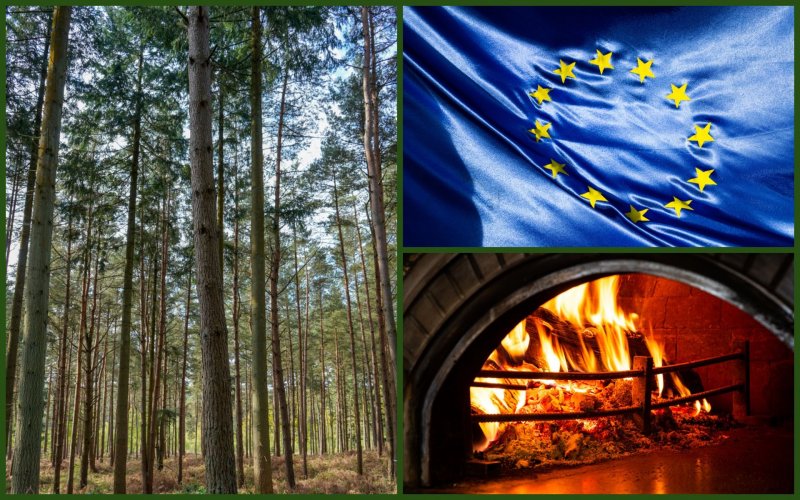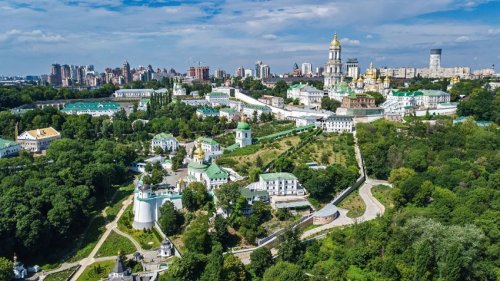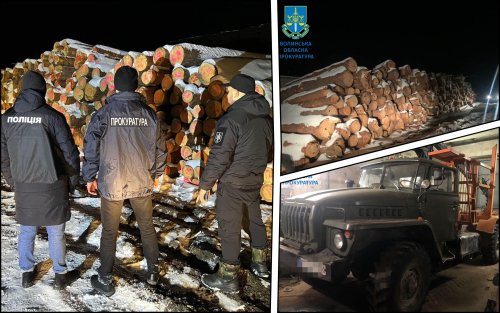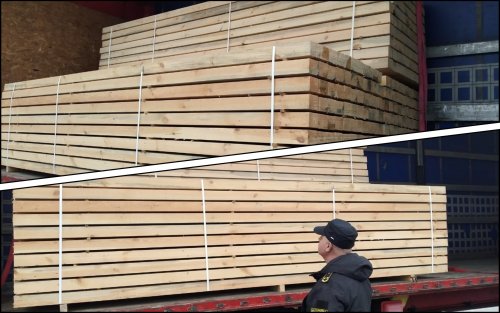What does this mean for forests?EcoPolitic figured it out.
In the European information space, the topic of deforestation was one of the first to be raised loudly by an influential publication Politico.
"Faced with soaring energy prices and potential blackouts, many EU governments are relaxing rules on logging and encouraging people to burn wood to keep their homes warm — something campaigners say spells disaster for Europe's already depleted forests are vulnerable," the newspaper writes.
Causes of cold winter
A new bulletin from the World Meteorological Organization suggests that the lingering La Niña phenomenon, which has affected temperature and precipitation patterns and exacerbated droughts and floods in various parts of the world, will continue into autumn and early winter in the Northern Hemisphere.
La Niña affects weather around the world and occurs regularly in the South Pacific, when a steady easterly wind drives warm water off the coast of Peru and Chile toward Indonesia and Australia. As a result, cold water from the depths of the sea rises to the surface, and the region is getting colder.
Europe bet on firewood, not forests
This year's winter is expected to be even colder than previously predicted. More and more Europeans are switching to wood heating in anticipation of rising electricity bills. Environmental NGOs warn that logging and monoculture plantations could damage biodiversity and make it harder to meet climate goals, as forests are now the EU's main carbon sink. They also note that burning wood releases harmful pollutants, including fine particulate matter, which has been linked to a number of diseases.
Greenpeace called it "madness" to cut down forests in order to soften the blow from the energy crisis.
"Cutting down protected forests to ensure energy security is madness and very, very destructive," said a member of the Hungarian Greenpeace Katalin Rodix.
In general, the situation regarding the European Union is as follows:
- In Romania , where more than half of the population already heats their homes with wood, the government has reduced the price of wood to reduce electricity bills.
- Since the summer, illegal felling and even theft of wood have become more frequent in Slovakia.
- Latvia sanctioned cutting down of young trees.
- Lithuania's environment ministry has asked the state-owned forestry company to increase logging to support the country's bioenergy supply.
- The Estonian government has so far resisted industry calls to increase logging.
- In Poland, many people took to cutting down trees to collect enough wood for the winter.
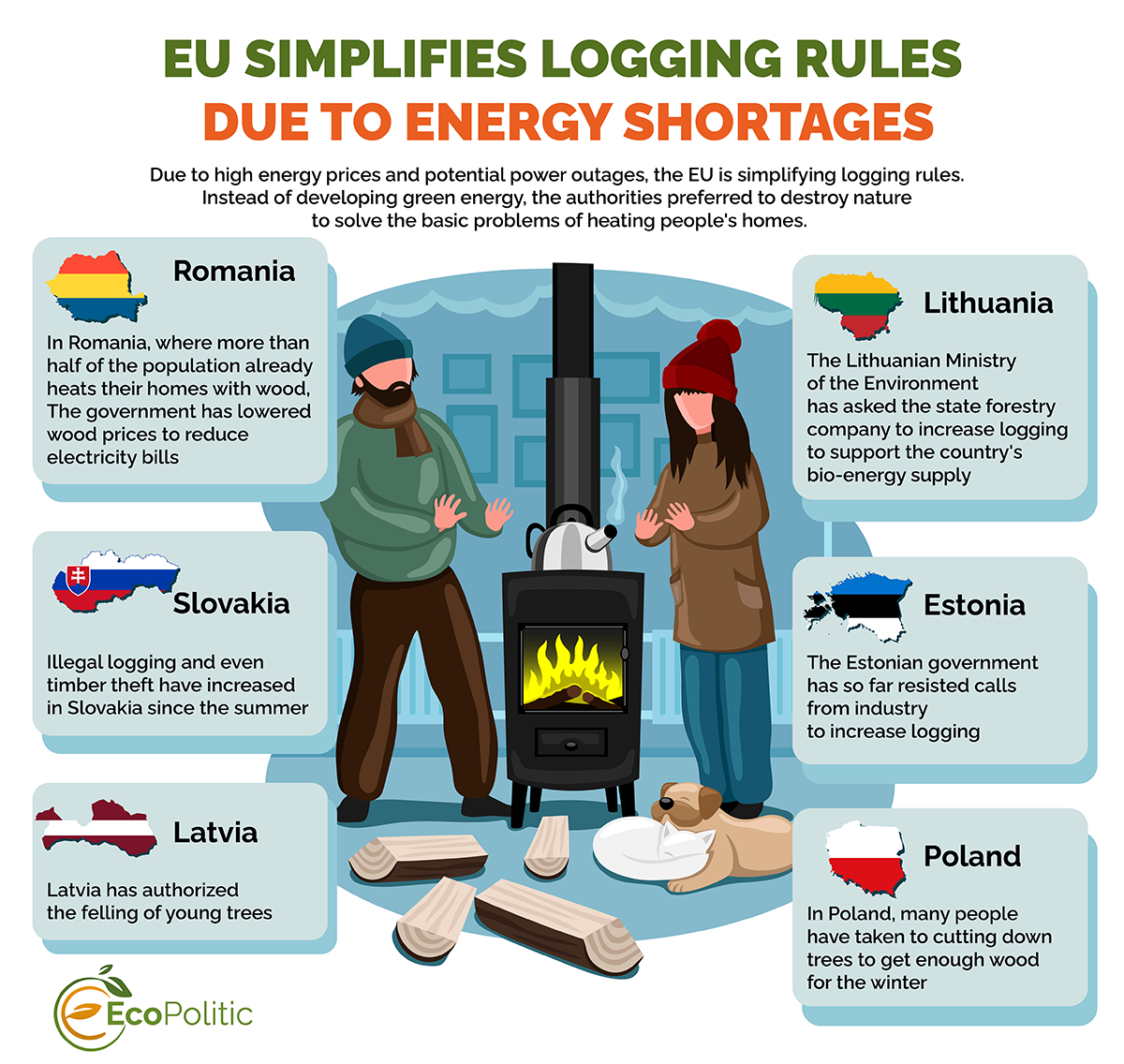
"Due to political indecision, logging in Estonian forests has not increased since the beginning of the war in Ukraine. But given the situation, it would be beneficial and necessary," said Henrik Vialja, director general of the Estonian Forestry and Wood Industry Association.
But the story is the same across the continent: firewood prices are rising, warehouses have filled their waiting lists until next year, and there are fears that all this will lead to serious environmental problems. Government agencies have expressed concern over illegal logging as people are expected to head to the forests in droves to stock up on fuel for the winter.
Some European politicians impress with their public statements. For example, Jarosław Kaczyński, head of Poland's ruling party, said in early September that people should "burn almost everything, of course, except tires and similar harmful things." According to him, the shortage of coal may affect about 2 million households.
The Hungarian government banned the export of pellets, while at the same time adopting environmental regulations that prevented logging in protected forests.
According to the report Bloomberg, prices for wood pellets (a compressed form of wood biomass), which usually burns better than conventional firewood, nearly doubled to €600 a tonne in France.
In Bulgaria, which depends heavily on wood burning for most households, prices have also doubled to €100 per cubic metre. In Poland last month it was claimed that the prices of firewood have already doubled this year. In August The Telegraph reported that the sale of firewood in Great Britain has increased fivefold this year.
Nature defenders also draw attention to the fact that burning raw wood pollutes the air — in this form, it emits more toxic particles.
Ukrainian environmental experts are convinced that such EU policy is full of contradictions. In a comment to EcoPolitics, the environmental director of the NGO "Save Dnipro" Anastasia Skok explained that now the issue of the winter energy crisis in Europe is intensifying, because with the observance of sanctions against Russia and the refusal of their energy resources, the opportunity to fully provide for the needs of citizens is also falling.
"This year, in the countries of the European Union, the supply of gas and oil even exceeded the average indicators of storage capacity, but the issue of providing heat and energy to local state institutions and business entities has not been closed. For this, recently, faced with a rapid increase in energy prices and a possible power outage, many EU governments soften the rules of cutting down forests, saying that cutting will be carried out exclusively in designated areas in forest farms that are subordinate to the state, and activists say that cutting can also be carried out in the territories of the Emerald Network and in the zones included to Natura 2000 (similar incidents have already been recorded in Romania)," Anastasia believes.
According to the expert, another subtle point is the contradiction between the new simplified conditions for cutting down the forest and the Directive on renewable energy sources adopted by the EU. According to this Directive, the governments of the EU member states have signed up to do everything possible to reduce the share of electricity generated from fossil and non-renewable sources.
"This also contradicts the energy block of the approved concept of the Green Agreement, where by 2050 the intention is to reduce the amount of emissions and greenhouse gases to the minimum possible level," Skok emphasized.
As it is already becoming obvious, in all 10 months since the beginning of Russia's full-scale war in Ukraine, EU countries have not taken any steps to find an alternative to Russian energy resources. It is for this reason that nature is suffering now. Ordinary citizens of the European Union have also become victims of the short-sighted policy of the authorities.
It is not known what the scale of environmental consequences will be for the entire continent. One thing can be said boldly, cutting down forests will not solve, but will only intensify, many problems that the EU has already faced not so long ago.
After all, only this summer Europe suffered from a drought, which turned out to be the strongest in the last 500 years . The water level in the rivers has dropped so much that the so-called hunger stones have come to the surface, which portends a bad harvest and hunger. And so, after a couple of months, the authorities were again not ready to solve the problems they faced.
The editorial staff of EcoPolitic closely monitors the energy crisis within the EU and the steps taken to overcome it. We will continue to inform our readers about developments.

